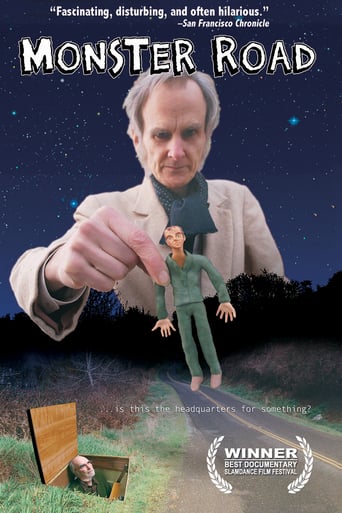MamaGravity
good back-story, and good acting
Robert Joyner
The plot isn't so bad, but the pace of storytelling is too slow which makes people bored. Certain moments are so obvious and unnecessary for the main plot. I would've fast-forwarded those moments if it was an online streaming. The ending looks like implying a sequel, not sure if this movie will get one
Skyler
Great movie. Not sure what people expected but I found it highly entertaining.
Francene Odetta
It's simply great fun, a winsome film and an occasionally over-the-top luxury fantasy that never flags.
ryandzirk
Bruce Bickford is the godfather of clay animation. This film won multiple awards for multiple reasons. It is completely in-depth and goes straight to the core of Bickford's art. Monster Road brings Bickford's world right to you. As Frank Zappa's house animator, Bruce Bickford spent many painstaking hours of tedious work on his animation. Today, as an independent animator, he continues the same thing. Weather it be 3-D clay animation or 2 dimensional line animation, Bickford makes sure he gets it just right. What a horror show you say? Most people are too scared to pour their brains out through their fingers and make it visible for the whole world to see and very few have the talent and patience to create such a colorful landscape of images that will haunt you for the rest of your days. I appreciate Brett Ingrams efforts in documenting of this LEGENDARY artist.
tedg
I was shown this by a young claymation filmmaker, someone I like. She's doing a claymation Dante and I'm sure it will be something important to some of you.What she likes about this fellow is the purity of his life and therefore his art. There is no room at all for reflecting on meaning or greater perspectives, what people often call "intellectual." His heart is in his hands, that is essentially his entire life and this is impressive because we can see both. Each endorses the other.The first remark I might make is about what we are intended to see and know: that this was a wounded soul, shot through in several ways and apparently both autistic and obsessive- compulsive. Like Crumb, a similar personality and the subject of a similar movie, his slightly interesting art takes on a grander meaning in this context. Both had a younger brother kill themselves.But I walked away from this with another perspective from the fourth metalevel. The first level is that this is art about other art, continuously morphing among recognizables. The second is his life as art. The third is the film artifact that was distilled as a whole thing itself as a documentary. The fourth is the context I was seeing it in, with a talented young claymationer.There are only three main ways of telling a story. Only three roots. These can be cleanly traced back to Shakespeare, Cervantes and Dante, each of which defined a language, a literary tradition and a method of reflection and folding. You might usefully characterize these are being based on adjectives-adverbs, verbs and nouns respectively.Those that makes the most effective literature and film to my mind, a conscious mind, are the first two. Indeed this film itself is in the Cervantes tradition: a world that defines a person with urges.But the man within is distinctly in the Italian tradition of storytelling: humans live and in living invest their surroundings with life. These humans bump into each other. They don't merely illustrate life, they ARE life and any story worth telling is attached to lives.What this man has made with his little scenes are different hells and purgatories, very much in the Dante tradition but without the resonant references. I am convinced that this can be engaging storytelling, but it can never be art, surely not using cinema. Yes, I know: Antonioni, Bertolucci, Scorsese, Pasolini, Coppola, even Fellini. Each had one success, and that was when they escaped their Italian constraints. Unless they change the world somehow — and it would have to be by a great man (sadly, a man) — they won't be able to ever have lifealtering art in this tradition. Only empathic tales.Watch this for tools, not lives.Ted's Evaluation -- 2 of 3: Has some interesting elements.
woundupwounded
(^ From the viewpoint of the other person in camera for a short rift about small places, I found the film to at long last find me not alone with the Bickford dilemma. Thanks to Brett for allowing me it drag him up to George's in order to give him an angle on Bruce's work that would inspire instead of horrify.Monster Road works as a documentary by giving viewers a breather between animation shots. I personally wince at the overload of graphics myself, even tho I've been overdosed to the point of inoculation by it."WHY , Bruce, WHY?!" seems to somehow finally been resolved, in a way that takes way too long hanging out with Bruce alone for most to bother.I hope this hitting DVD will open up the viewing audience to Alzheimer care givers' discussion groups.
jklarl
Animation fans take note: This doc about the life and work of legendary animator Bruce Bickford has it all. A triumph of the little guy, this documentary kicks a substantial number of asses. If you are someone with a sensible ass (and you know who you are), then this film will kick it! See it and find out for yourself! Don't be one of those dudes that gets impaled on the wheel of torture.

